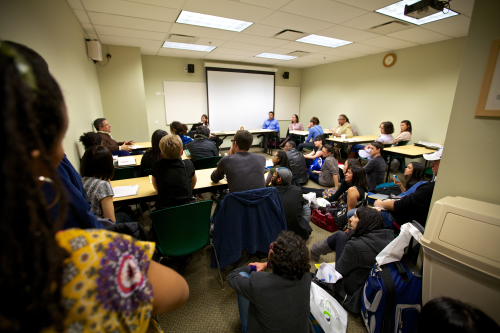Oct 29, 2012
Mixed Race Issues to be Examined at DePaul University Forum
Mixed Race Issues to be Examined at DePaul University Forum
As Americans of mixed racial ancestry continue to grow in number and diversity, the demographic, social, political and cultural implications for the country become more complex. These issues will be examined from a variety of perspectives at a groundbreaking conference that will bring scholars and artists from around the United States and the world to DePaul University Nov. 1 through 4.
The conference will include 50 programs featuring research presentations, panel discussions and performances that explore various aspects of the emerging field of Critical Mixed Race Studies. More than 150 presenters from the U.S. and other countries, including the Philippines and the United Kingdom, are expected to attend.
Individual programs will examine issues such as discrimination against mixed race persons, mixed race student organizations and mixed race gender and sexuality issues. Individual panel topics include: “Assessing Mixed Race Iconography: Barack Obama and Tiger Woods;” “Clearly Invisible: Racial Passing and the Color of Mixed Race Identities;” and “Media, Celebrity and Beauty: The Visuals of Mixed Race.”
All programs are free and open to the public. A full schedule of events, times and locations is online at http://tinyurl.com/c4c5zgz.
According to a 2011 Pew Research Center report examining 2010 U.S. Census data, more than nine million Americans identified themselves as belonging to two or more racial groups. That figure was up 134 percent compared to data in the 2000 U.S. census, which was the first to allow individuals to identify more than one race.
The study of mixed race issues is the transracial, transnational and interdisciplinary critical analysis of the institutionalization of social, cultural and political orders based on dominant conceptions of race. This scholarship examines the mutability of race and the porousness of racial boundaries in order to critique processes of racialization and social stratification based on race. This emerging discipline also addresses local and global systemic injustices rooted in systems of racialization. The conference is sponsored by DePaul’s College of Liberal Arts and Social Sciences.
“Critical Mixed Race Studies is a rapidly evolving area that draws from diverse disciplines. This year’s conference is dedicated to better defining what the field entails,” said Camilla Fojas, the Vincent de Paul Professor of Latin American and Latino Studies and an organizer of the conference, which was first held in 2010 at DePaul. “As the complexity of the nation’s racial makeup increases so too does the depth and breadth of scholarly research into the topic.”
In addition to scholarly presentations, the conference will feature cultural events each afternoon from the Midwest Mixed Roots Festival. All programs will be held at the DePaul Student Center, Room 120, 2250 N. Sheffield Ave., Chicago. Specific programs include:
Nov. 1, 5:45 p.m.: Selected Short Films: “Silences,” “Crayola Monologues,” “Mixed Mexican” and “Nigel's Fingerprint,” which explore themes of racism, familial relationships, the census and how people define themselves in a world obsessed with categorizing people by color.
Nov. 2, 5:15 p.m.: Filmmakers Panel featuring three filmmakers — Kip Fulbeck, Jeff Chiba Stearns and Kim Kuhteubl — discussing their storytelling journeys on film and what inspired them to tell stories of the mixed race experience.
Nov. 3, 5:15 p.m.: Mixed Roots Midwest LIVE — an evening of energetic, thought-provoking performances featuring spoken-word artists who meld performance art with an exploration and critical analysis of what it means to be racially mixed.
About DePaul University
With approximately 25,000 students, DePaul is the largest Catholic university in the United States and the largest private, nonprofit university in the Midwest. The university offers about 275 graduate and undergraduate programs of study on three Chicago and three suburban campuses. Founded in 1898, DePaul University remains committed to providing a quality education through personal attention to students from a wide range of backgrounds. More at www.depaul.edu.

DePaul University’s Critical Mixed Race Studies conference draws hundreds of participants from around the country
